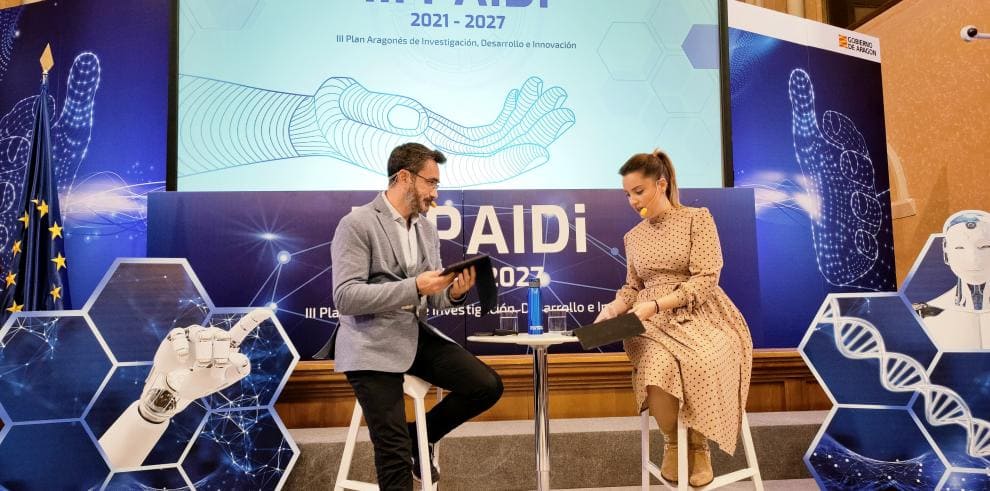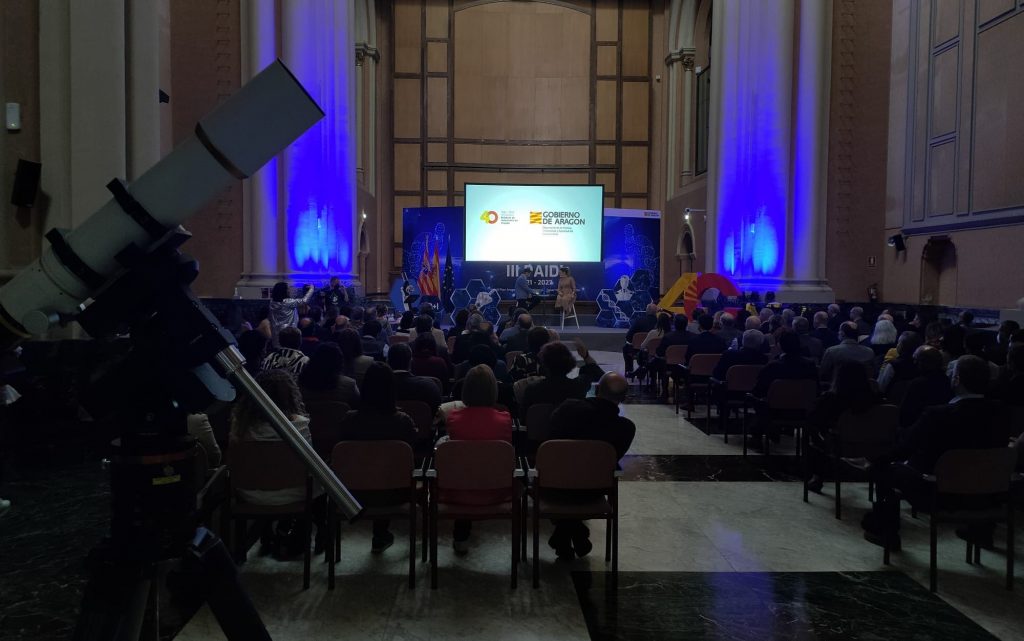(Zaragoza. Tuesday, May 3, 2022). Aragón has a new Regional Plan for Research, Development and Innovation (PAIDI) to “take a qualitative and quantitative leap in R&D&i” and continue advancing towards a green, sustainable, equitable and digital Aragón, which improves well-being and the quality of life of the Aragonese and contributes to the socioeconomic development of the Community. The strategy designs a six-year roadmap and incorporates the main strategic lines, objectives, lines of action and actions for the best development of science, technology and knowledge.
The document, which was presented today in the Sala de la Corona by the Minister of Science, University and Knowledge Society, Maru Díaz, and the General Director of Research and Innovation, Enrique Navarro, before the scientific-technical and university ecosystem of the Community, comes to update the previous one, which was designed for the period 2005-2008, and which had been extended since then.
The III PAIDI is based on three basic pillars, excellence, knowledge transfer and internationalization, with the economic guarantee provided by the R&D&I Fund, included in the budget and which this year alone includes 176.6 million euros in different shares.
The Government of Aragon, through a press release, assures that the strategy will also contribute to continue growing in attracting European funds, after Aragon was the Community that increased the most in return in the European R&D+ Framework Program i Horizon 2020 (217% more), with 176.3 million captured by the Aragonese ecosystem thanks to the participation of SMEs, technology and research centers, and the University in 500 projects.
In order to prepare the plan, a work has been done in recent months to collect information and consult numerous actors in the ecosystem. In fact, more than 400 entities and companies from the productive sector have participated; 88 main researchers from research groups in the Community and 56 managerial and executive profiles linked to public and private R&D&I. In addition, 21 workshops have been held, two of them specific to citizen participation.
As a result of the process, a detailed diagnosis of the scientific and technological capacities of Aragon has been obtained, with its weaknesses, strengths and opportunities, as well as the needs of the actors in the R&D ecosystem. And five major challenges have been identified: achieving scientific excellence, attracting and retaining talent; effectively transfer the knowledge generated, increase internationalization, improve coordination and management, and involve society.

In response to these challenges, the plan is structured around five basic objectives, which in turn are broken down into 9 priority lines of work and 34 actions.
-Foster scientific excellence: We will bet on both the training, incorporation and retention of talent as well as the improvement of the infrastructures where said talent develops its work, to strengthen the capacities of the ecosystem, gaining in competitiveness and in capturing resources. Among the planned measures, new aid is foreseen for junior post-doctoral contracts or to promote research mobility, reinforcement of talent attraction programs through ARAID, more aid to university and mixed research institutes, the promotion of centers of excellence in Aragon, as well as specific funding for equipment in transversal services to support research or more support for the five Singular Technical Scientific Facilities that Aragon treasures.
-Create R+D+i ecosystems. Interactive processes where the public and private sectors identify new ideas that can materialize in new processes or products will be encouraged. Innovative financing instruments for R&D&I will be promoted, such as the public purchase of innovation; The cluster policy directed towards areas of specialization will be supported; Strategic cooperation projects between technology centers and companies will be promoted; The ecological, digital and resilient transition of the productive fabric will be facilitated and social innovation actions aimed at citizens will be implemented.
-Promote international, national and regional cooperation. The aim is to maintain international collaborations with reference organizations and make a quantitative leap in the participation and coordination of Horizon Europe projects, among others, increasing the presence in international forums and consolidating international events. Among other actions, the complementary nature of aid for projects is contemplated.
R&D&I projects of competitive, national and international calls that have been well evaluated.
– Strengthen the management, coordination and financing of R&D&i. The leadership, alignment and coordination of the institutions and organizations of the R&D&I ecosystem will be promoted to accelerate their reaction capacity as a key to improving the management of research and innovative activity. In this section, the gender perspective will be introduced as a transversal category in R&D&i, with the adoption of new positive discrimination measures; there will be continuous monitoring of public policies on the matter; A map of actors in the R&D system will be implemented to enhance their interaction, and the new Aragón Investiga website will be developed as a nerve center of information for the entire community and as a tool for disseminating the programming of calls.
-Encourage culture and scientific vocations. The investigative nature of groups not linked to R+D+i will be promoted, creating appropriate educational and informative environments, where scientific vocations and the critical and participatory spirit of the citizenry flourish. To this end, it plans to continue making the role of science visible and awarding prizes and awards in the fields of science, technology and innovation.
The plan, as explained by the director and the general manager, was born to be a “living and updatable” instrument. To this end, a monitoring and evaluation system has been implemented, through a new system of indicators and governance, based on the quadruple helix and which will periodically serve to determine the impact of the actions and the level of achievement of the objectives. This new system will promote participation, transparency and the development of actions that will allow the instrument to be adapted to the context of each moment and provide agents with tools to face the future challenges they face.

Consult the III Aragonese Research, Development and Innovation Plan
The III Plan has been developed simultaneously and in coordination with the Smart and Sustainable Specialization Strategy of Aragon (S4), the transversal tool for coordination of the entire Aragonese innovation system and which will concentrate resources in the economic areas in which Aragon It has significant competitive advantages. These areas are agri-food, sustainable mobility, green energy and fuels, health and well-being, advanced technologies, and cultural and creative industries and sectors.

